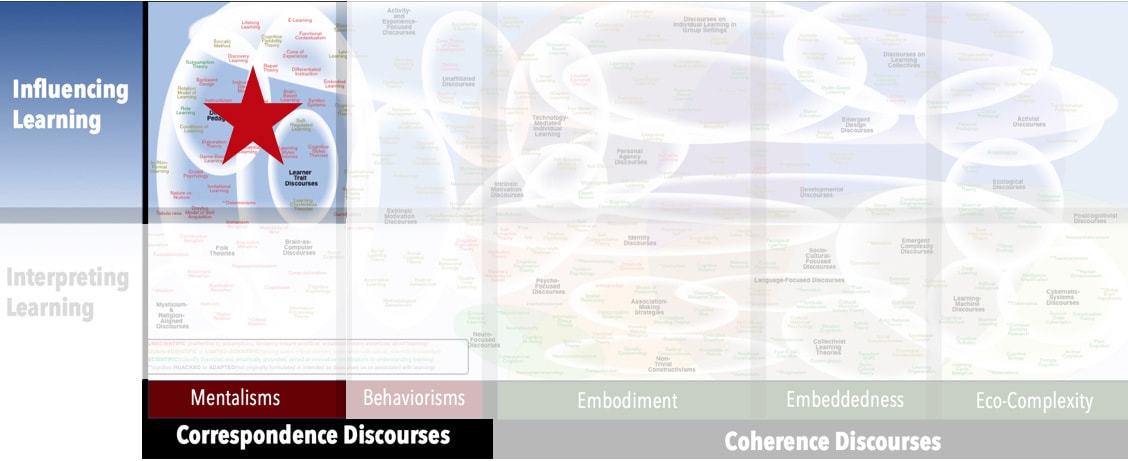AKA
Kolb’s Experiential Learning Theory
Focus
Learner engaging with the environmentPrincipal Metaphors
- Knowledge is … useful information
- Knowing is … mastered information
- Learner is … an active agent (individual)
- Learning is … gleaning information by reflecting on doing
- Teaching is … facilitating, guiding
Originated
1980sSynopsis
Experiential Learning is, in essence, formalized teaching advice based on the ancient realization that humans learn by doing. Focusing on the individual, it recommends firsthand experiences (versus hearing, reading, or watching others’ experiences). Such learning should occur in real-world environments, affording the learner concrete experience, opportunity to reflect on that experience, opportunity to develop abstract concepts based on that reflection, and opportunities to experiment to continue the cycle of learning. Subdiscourses of Experiential Learning include:- Adventure Education – focused on challenges, races, and so on. Outdoor activity is emphasized, and Learning Styles Theories are typical invoked as both focus of and justification for the adventures.
- Hands-on Learning – subject to a variety of interpretations, but most often characterized as a type of Experiential Learning with diminished emphasis on abstraction and reflection. (Hands-on Learning is also often conflated with Learning Styles Theories, especially the category of Tactile Learner (Kinaesthetic Learning; Hands-On Learner ).)
- Forest Kindergarten (Waldkindergarten) (Ella Flautau, 1950s) – a daycare, pre-school, or Kindergarten experience that is undertaken almost entirely outdoors in a forest environment, in which both structured and unstructured activities are centered on aspects or objects of nature
- Forest School (Bridgwater College, UK, 1990s) – influenced by a movement that began in Germany in the early 1900s, an experience-focused, learner-centered, play-based, challenge-oriented approach that is intended to occur in natural settings over extended (multi-season) periods. Forest School is aimed at holistic (physical, emotional, social, spiritual, and intellectual) development, under the guidance of trained and certified teachers.
- Initiative-Based Learning (various, early 1900s) – an educational approach that emphasizes student initiative and active participation in the learning process by involving learners in local-scale, sustainability-themed, and action-oriented projects that may involve businesses, government agencies, and other organizations
- Outdoor Education (Nature-Based Learning; Outdoor Learning; Outdoor School; Wilderness Education) – a phrase that is subject to a wide range of interpretations. Most of those involve learning that is in, for, and/or about the natural environment. Perhaps the most prominent conception of Outdoor Education is a form of Experiential Learning that occurs in or that is focused on the outdoors.
- Wild Child (Sierra Club, 2010s) – a program designed to support children’s appreciations of the ecological complexity of where they live while fostering senses of responsibility toward the more-than-human world– through, for example, involving children in explorations, examinations, and discussions of urban nature landscapes
Commentary
Experiential Learning was proposed alongside a spectrum of learner-centered pedagogies in the 20th century, such as Active Learning and Inquiry-Based Learning. Unlike most of those perspectives, however, Experiential Learning was neither oriented nor supported by a scientifically defensible theory of learning. Rather, Experiential Learning boils down to a shift in metaphor, away from the Acquisition Metaphor’s image of a passive learner toward the Attainment Metaphor’s image of a somewhat more active learner. Matters of the nature of knowledge and the complexities of learning remain uninterrogated. Consequently, the insights and advice of Experiential Learning, while not necessarily misguided, offer little beyond the commonsensical realization that attaining a goal involves traversing a path.Authors and/or Prominent Influences
David A. KolbStatus as a Theory of Learning
Experiential Learning is not a theory of learning.Status as a Theory of Teaching
Experiential Learning is a theory of teaching.Status as a Scientific Theory
Experiential Learning is principle that, while generally accepted and supported by substantial evidence collected in studies of scientific theories of learning, is not directly associated with a focused scientific program of research or a critical attentiveness to grounding assumptions.Subdiscourses:
- Adventure Education
- Forest Kindergarten (Waldkindergarten)
- Forest School
- Hands-on Learning
- Initiative-Based Learning
- Outdoor Education (Nature-Based Learning; Outdoor Learning; Outdoor School; Wilderness Education)
- Wild Child
Map Location

Please cite this article as:
Davis, B., & Francis, K. (2024). “Experiential Learning” in Discourses on Learning in Education. https://learningdiscourses.com.
⇦ Back to Map
⇦ Back to List
